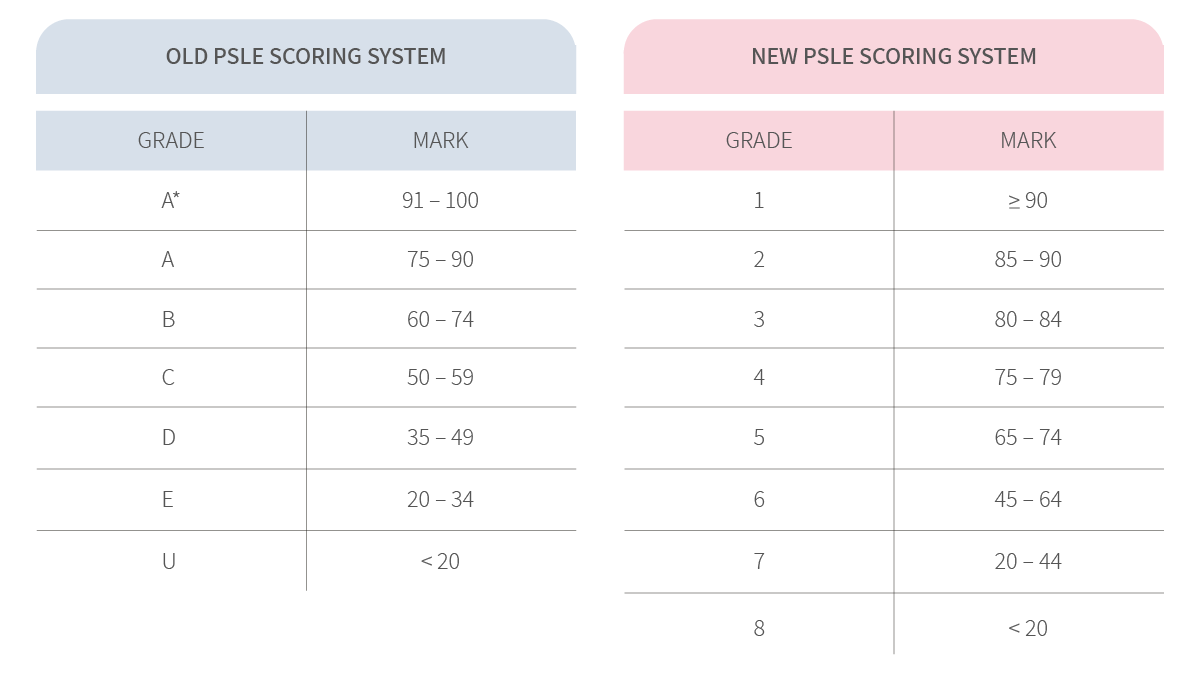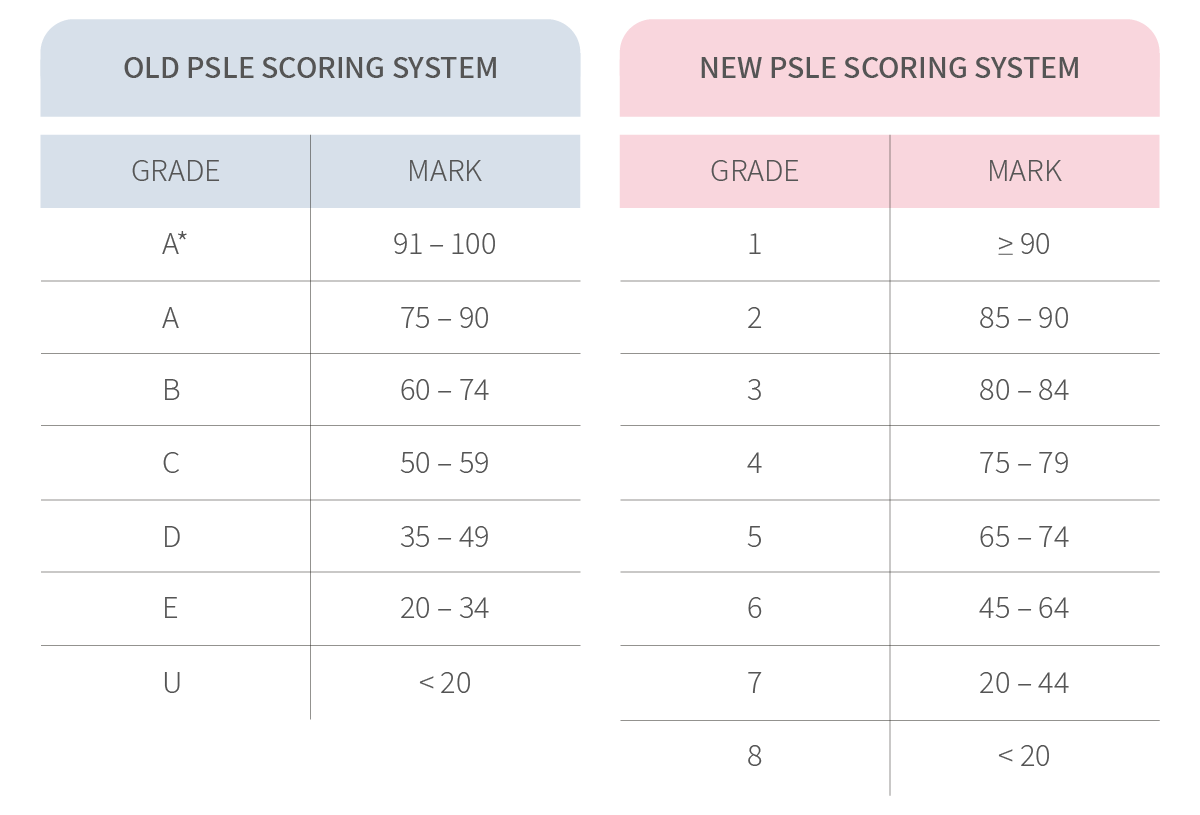From 2021 onward, the Primary School Leaving Examination (PSLE) is slated to undergo a major revamp, with T-scores being done away with entirely. With our detailed breakdown in hand, you can ensure that both you and your child will be more than prepared for the changes coming your way.

It’s no secret or news that Singapore has one of the best education systems in the world. While China may have taken the top spot in the Organisation for Economic Co-operation and Development (OECD)’s 2018 Programme for International Student Assessment (Pisa), Singapore’s 15-year-olds still came in overall second for reading, mathematics and science.
This tradition of academic excellence has been decades in the making. As the late Minister Mentor Lee Kuan Yew had often reiterated, Singapore’s only and most valuable natural resource is its people. The government of Singapore has therefore placed great emphasis on cultivating the nation’s human capital through a robust education system.
To maintain its edge over other countries, however, Singapore will have to keep moving forward and tweaking its educational framework for the benefit of future generations. In light of changing emphases and the needs of an ever-evolving global economy, the Ministry of Education (MOE) announced a raft of changes to the local education landscape in 2018, some of which have already been rolled out.
Many, if not most, of these changes represent a paradigm shift from a predominantly textbook-based curriculum to a problem-solving system which de-emphasises grades and prioritises higher-order thinking. Nowhere is this more obvious than in the revisions to show how the Primary School Leaving Examination (PSLE) is administered, crafted and graded.
In this article, we zoom in on the changes to the PSLE, paying particular attention to how its questions have evolved over the years, as well as to the revised scoring system which will take effect from 2021.
The PSLE was inaugurated in 1960 as part of efforts to bring Singaporean schools under a unified education system with a common curriculum. Today, it has become a true rite of passage for all Primary 6 students, and a cornerstone memory for three generations of Singaporeans.

With six decades of history to its name, the PSLE has undergone numerous changes over time. Those who graduated in the 1980s may remember that their schoolmates in the Monolingual stream actually took the Primary School Proficiency Examination in Primary 8 instead of Primary 6.
Recently, however, the focus has been on moving towards a more skills-based approach in all four of the PSLE’s examinable subjects (English, Mother Tongue, mathematics and science). Rather than relying on rote memorisation, students are increasingly encouraged to think out of the box, adapt to the requirements of more sophisticated questions and apply the concepts they have learnt in new and innovative ways.
In our analyses of PSLE questions from the last few years, our teachers and curriculum specialists have noticed that questions requiring the application of higher-order thinking skills have been increasing in frequency and weightage. Such questions have been a feature of the PSLE for many years, but they are now appearing more regularly and testing for a greater depth of knowledge than they ever have before.
By depth of knowledge, we are referring to questions that ask for more than the mere regurgitation of facts, assessing students on how well they can connect and apply, as well as reason and justify. To give you a clearer idea of how questions on the PSLE are evolving, our curriculum teams have provided illustrative before-and-after examples below — one set each for English, Mathematics and Science.
In this English PSLE comparison guide, our P6 teachers examine and demonstrate how the composition and comprehension components differ in difficulty and complexity throughout the years.
In this Maths PSLE comparison guide, our P6 teachers show how rote learning can no longer be used to solve questions, as there are more questions which require higher-order thinking and logical reasoning skills.
In this Science PSLE question guide, our P6 teachers share about the varying complexities of current Science questions that test students’ depth of knowledge, and the requirements to derive answers.
Apart from questions that require the use of higher-order thinking skills, the way the PSLE itself is scored will soon be completely overhauled. From 2021, students will no longer be receiving a numerical T-score or letter grades (A* to F) on their PSLE results slips.
Instead, an Achievement Level (AL) between 1 and 8 will be assigned to each examinable subject, such that every student will receive an overall PSLE score ranging from 4 to 32.

Like with the current ‘O’ Level scoring system, the smaller the score, the better (i.e. the best possible score is 4). Just remember that less is more.
Each AL is still tied to a particular mark range (e.g. AL 1 is equivalent to 90 marks and above), but exactly what range of marks corresponds to which AL is not quite the same as for the previous letter grades.
It can be rather confusing to keep track of all the numbers relating to the new scoring system, but we have broken down the exact mark range for all the ALs in our handy infographic below.


As you may have already noticed, the key difference between the new ALs and the previous grading system is the redistribution of marks for a narrow range in the upper grades and a wider range in the lower grades.
To put this into perspective, imagine Student X scored 82 marks and Student Y scored 88 marks for PSLE English. Under the old PSLE scoring system, both students would obtain an A grade in English. However, if their scores were revised to reflect the new scoring system, Student X would now receive an AL 3, whereas Student Y would receive an AL 2.
We will delve further into this in the next section.
With changes to both the questions students will encounter and how their scores will be computed, the PSLE experience is guaranteed to transform in new and unexpected ways.
Based on the information provided so far, however, we can reasonably conclude that the changes will affect your child in these 5 following ways.

According to the MOE, the new scoring system will “reduce excessively fine differentiations of students at a young age”.
For many who have taken the PSLE in the past, a brief stroll down memory lane may dredge up unpleasant memories of grade comparisons, initiated by relatives, teachers and peers alike.
In the past, a 1-mark difference in the T-score might be the make-or-break factor in getting into one’s dream school.
Also, by virtue of being computed in absolute numbers, the T-score gave rise to an unhealthy culture of comparison, where some competitive parents may have proudly proclaimed something along the lines of: “Oh your daughter got 259? My boy got 260.”
The implementation of the new AL grading system, however, curtails such microscopic comparisons and makes it harder to split hairs. Due to the fact that the scoring system leaves little room for much differences, many students will have the same overall score (we foresee many high achievers attaining an overall score of 4), or scores with lesser disparity.

Under the new scoring system, each student will also be evaluated according to their own performance, instead of that of their peers (i.e. there is no bell curve grading where students’ scores are scaled depending on how the mass majority of the cohort performs).
The basis of the AL system is to provide the student and their parents greater clarity in measuring the student’s progress. This emphasises how well a student has learnt, rather than how well they have done compared to others.
This in turn allows students to identify their strengths and weaknesses and focus on their own learning progress instead of trying to compete and outdo others.

The margin for success (i.e. achieving an overall PSLE score of 4) is now lower. While it has become easier for students to pass, it is increasingly more challenging for students to obtain the ALs located at the higher tiers for each subject due to the banding that drastically narrows at the top.
This situation is further exacerbated by the fact that questions requiring higher-order thinking skills and applications are now appearing in the PSLE with higher frequency, and these questions usually tend to carry high weightage of marks.
This means that students will now have to demonstrate greater conceptual mastery in order to earn the marks allocated to such questions.

On the flip side, there is greater margin for error in the lower tiers of the AL grading scale as the banding broadens and expands down the bottom. For example, a student who scored 34 in Maths may have been allocated an E grade, however with the AL system, he or she would receive an AL 7, similar to another student who may have previously gotten a D with 42.
This gives students more leeway with a subject that they may be weaker in, while allowing their stronger subjects to push down the overall score.
Through this rite of passage that all Singaporean children have to go through, parents play a significant role in building and refining their children’s knowledge, skills and disposition, along with managing their learning expectations, beliefs, goals and coping strategies.

Part of being involved in your child’s academic life includes ensuring that they are engaged and challenged in their educational environment, as well as supporting their learning journey.
Children with involved parents or guardians can develop a positive perception of their skills, abilities and uniqueness through fulfilling and nurturing ways.
In the context of the PSLE changes, students and parents may be negatively impacted and disheartened should they happen to receive an AL 4 for a particular subject (which would be an A under the old grading system), as the number 4 seems quite low down the tier.
Well-meaning parents may aspire for their children to get an AL 1 or AL 2 for each subject, the same way how many parents of yesteryear would be proud if their children achieved A*/As across all 4 subjects.
While an AL 1 is equivalent to an A* (both would require students to score 90 marks and above), getting an AL 2 (85–89 marks) is substantially more challenging to attain than an A (75–90).
Here are several ways you can be a positive source of support and motivation for your child throughout his or her PSLE journey:

There are both positive and negative aspects of parents’ aspirations for their children’s academic performance. High parental aspiration can lead to an increased academic achievement, but only when it does not overly exceed realistic expectations.
Your aspirations for your child have to be realistic and manageable with the right amount of motivation and belief in your child’s capabilities. Reasonable amounts of pressure can be a good motivator.
An over-achieving, pernicious expectation may wreak havoc on a child’s mental well-being and cause them to experience anxiety, low confidence and frustration brought on by the immense pressure, which can hinder academic performance.
When the pressure is interminable and intense, your child may become fearful of making mistakes and may have trouble admitting shortfalls and forgo asking for help, even if they truly need it.

As a parent, it is important to find the right balance of setting expectations that are high without setting your child up for failure or causing undue stress when they are unable to hit those expectations.
It is a balancing act and you know your child best and can make the appropriate guidelines for them.
Adjust and tailor your definition of academic success according to your child’s capabilities.
Furthermore, you can place more emphasis in praising and taking pride in your child’s growth, progress and how far they have come, rather than just focusing on their exam scores.

It’s also important that your child enjoys the learning process. Look for enriching opportunities on how you can be involved in your child’s PSLE journey.
This can include cheering them on, helping them with their homework and revision, keeping up to date with your child’s progress in school, setting goals, implementing a reward system to incentivise them, speaking with them about dealing with stress, and searching for ways to learn outside of the classroom.
Staying involved shows that you take utmost importance in their wellbeing and education which can give your child a huge boost. Constantly checking in to see how your child is doing also offers them an opportunity to ask for help when they need it.

Remember that children thrive on positive reinforcement. With constant support, you can provide the critical resources in managing your child’s emotional state of mind, coping mechanism and learning attitude.
By building your child’s confidence, positivity and individual self-expression, you are contributing to their emotional intelligence, optimistic outlook for success both in their academic journey and life, and equanimity in taking on any challenges that lie ahead.
Your child’s ability to handle stress and any huge undertakings, like the PSLE, with poise, improves if they have been successful and supported in overcoming obstacles in the past, as well as if they believe in their own competency.

These PSLE changes may seem daunting and confusing, but with the right guidance, your child can bridge the divide between the changes and their academic skills.
Encourage your child to aim high and they may just be able to reach for the stars. Set up a support system to nurture your child’s potential to meet high standards and become an independent learner, while establishing healthy expectations for them.
Getting parents to have higher hopes for their children is one of the many goals we hope to achieve at The Learning Lab with our programmes which are designed to improve performance in examinations and the real world at large.
Don’t get us wrong though; the focus of our programmes is not in blindly increasing your aspiration but in providing you with the in-depth information and knowledge you need to support your child in their learning journey, along with equipping your child with the necessary skillset and disposition to excel in school and beyond.
The PSLE is a huge milestone in your child's academic life. Ensuring that your child has everything they need in the lead-up to the major exams will allow them to focus on effective, efficient and productive learning.

While being involved in your child's PSLE journey is pivotal to their success, we understand that you may neither have the time to sit down every day and go through your child’s homework and revision with them, nor the expertise to help with every subject, especially when MOE is incorporating more higher-order thinking questions into each subject’s syllabi.
As you provide the ubiquitous emotional support and encouragement, our teachers at The Learning Lab can provide your child with the technical know-how in tackling these challenging PSLE questions through our proprietary strategy to boost their metacognitive skills.
Metacognition is vital for students to thrive academically, in their future careers, and in life-long learning. It helps promote autonomy and resiliency, and empowers students to grow into problem-solvers and critical thinkers.
With the increase in frequency of higher-order thinking questions that carries substantial weightage in the PSLE, it is of the utmost importance that your child at this junction, learns how to analyse, synthesise and reason rather than simply mug and memorise. When your child is equipped with strong metacognitive skills, they are able to anticipate change and navigate complex questions with aplomb.
Even though metacognition is a natural part of every student’s learning process, many students often need the additional support to fully comprehend how metacognitive thinking can be applied to the PSLE questions. This is why The Learning Lab's teachers meticulously model metacognitive thinking strategies by walking students through the labyrinthine process verbally and making the process visible for them.
In The Learning Lab's classes, students will revisit PSLE questions that focus on higher-order thinking to allow them to flex their metacognitive and analytical muscles.

This means of metacognitive coaching, in The Learning Lab's English, Maths and Science programmes, forms the basis for your child to develop the autonomy in deciding or developing a problem-solving method best suited for them.
Rote learning is not the way to truly learn and master a subject. We reference and showcase various creative modes of learning to empower our students in thinking out of the box to interpret and infer answers.
Our teachers also encourage and advocate associative and active learning by constantly exposing students to more than just the model answer or "best" method to solve a question.
By brainstorming about an extensive compendium of possible solutions together, our students can learn how to tackle higher-order questions in their own way, specifically tailored to how they learn and apply their individual strengths best.
When your child is given the opportunity to develop their own unique techniques in thinking analytically, critically and inventively, it further hones their metacognitive skills and ensures that they improve both their self-awareness and ability to choose effective thought processes for the PSLE and beyond.
Click here to find out more on how you can equip your child with the tools to ace the PSLE with our highly-trained teachers, targeted pedagogy and customised curriculum.
The Learning Lab has a wealth of resources you and your child can benefit from. Read our other articles that break down each PSLE component in detail and impart strategic advice and study tips.
Find valuable tips on ways to help your child master the content covered in exams, hone key exam skills and how to exercise the right habits and attitudes to make this road towards the PSLE as rewarding as it is meaningful for your child.
An effective revision strategy is essential in this crucial exam year. From motivation to goal-setting, reflective learning to revision time-tabling, this e-book chapter will help you and your child put in place a game plan that leads to PSLE success.
Our academic specialists shed light on the key points that oral examiners look out for in awarding an excellent grade for this component, and tips on how you can help your child hone key reading and speaking skills in the lead-up to the exam.
The PSLE is a huge milestone in your child's academic life. Ensuring that your child has everything they need in the lead-up to the major exams will allow them to focus on effective, efficient and productive learning.
Click here to find out more about our proprietary game plan that will gear your child up for PSLE success.
The Learning Lab is now at 8 locations. Find a location that suits your needs.
If you have any questions about our range of programmes or class schedules, you may contact us at 6733 8711 or drop us an email at enquiry@thelearninglab.com.sg.
The Learning Lab is now at 8 locations. Find a location that suits your needs.
If you have any questions about our range of programmes or class schedules, you may contact us at 6733 8711 or drop us an email at enquiry@thelearninglab.com.sg.